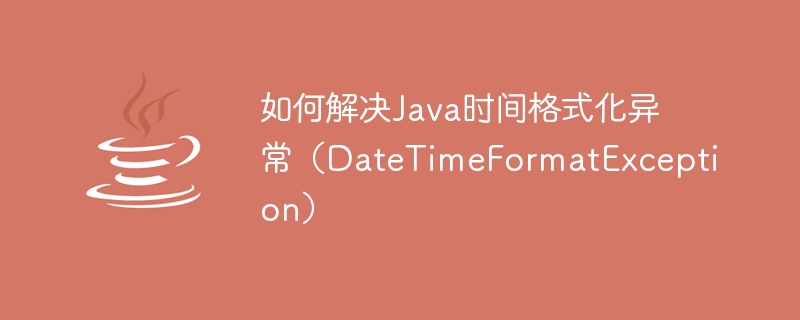

How to solve Java time format exception (DateTimeFormatException)
Introduction:
Java is a widely used programming language that is often used when processing dates and times. A formatting exception (DateTimeFormatException) will be encountered. This article will explain how to resolve time formatting exceptions in Java and provide some code examples.
1. What is a time formatting exception (DateTimeFormatException)
In Java, a time formatting exception refers to an exception that occurs when converting a string to a specific date and time format. This exception usually occurs when the string does not match the expected date and time format.
2. Solution
The following is a sample code that uses a try-catch block to handle time formatting exceptions:
import java.text.SimpleDateFormat;
import java.util.Date;
public class DateTimeFormattingExample {
public static void main(String[] args) {
String dateString = "2022-01-01";
SimpleDateFormat dateFormat = new SimpleDateFormat("yyyy-MM-dd");
try {
Date date = dateFormat.parse(dateString);
System.out.println("Parsed date: " + date);
} catch (java.text.ParseException e) {
System.out.println("Invalid date format: " + dateString);
}
}
}In the above example, we created a SimpleDateFormat object specifying the desired date Format. We then use the parse method to try to convert the string into a date object. If the conversion is successful, we print out the converted date; if the conversion fails, a DateTimeFormatException exception is caught and a prompt message indicating that the date format is invalid is printed.
The following is a sample code that uses the DateTimeFormatter class to handle time formatting:
import java.time.LocalDate;
import java.time.format.DateTimeFormatter;
import java.time.format.DateTimeParseException;
public class DateTimeFormattingExample {
public static void main(String[] args) {
String dateString = "2022-01-01";
DateTimeFormatter formatter = DateTimeFormatter.ofPattern("yyyy-MM-dd");
try {
LocalDate date = LocalDate.parse(dateString, formatter);
System.out.println("Parsed date: " + date);
} catch (DateTimeParseException e) {
System.out.println("Invalid date format: " + dateString);
}
}
}In the above example, we created a DateTimeFormatter object, specifying the desired date format. We then use the parse method to try to convert the string into a LocalDate object. If the conversion is successful, we print out the converted date; if the conversion fails, a DateTimeParseException exception is caught and a prompt message indicating that the date format is invalid is printed.
Conclusion:
Time formatting exception is a problem often encountered when processing dates and times in Java. We can easily resolve such exceptions by using try-catch block or using DateTimeFormatter class. Of course, in actual development, we should also follow best practices to ensure that the input date string matches the expected date format to reduce the occurrence of exceptions.
In short, it is very important to understand how to solve Java time formatting exceptions, which can help us better handle dates and times and improve the robustness and reliability of the software. Hope the content of this article is helpful to you!
The above is the detailed content of How to solve Java time formatting exception (DateTimeFormatException). For more information, please follow other related articles on the PHP Chinese website!
